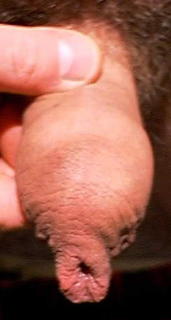Circumcised, that is. And you can bet none of their parents went through the bewildering debate that faces parents today.
Here, in the 21st century, the most performed surgery in America is the subject of intense controversy and debate.
 Some people say it's a barbaric form of mutilation, medically unnecessary and extremely painful. Others say the simple operation is a lifesaver that helps stave off serious infections and even cancer and AIDS.
Some people say it's a barbaric form of mutilation, medically unnecessary and extremely painful. Others say the simple operation is a lifesaver that helps stave off serious infections and even cancer and AIDS."Circumcision is a very contentious subject," says Dr. Edgar Schoen, the former head of pediatrics at Kaiser Oakland, Calif., whose new book, "On Circumcision," is reigniting the debate about circumcision. "After all, you're talking about a subject that transcends psychology, medicine, religion and sex. It's not merely a simple operation."
"Circumcision lowers the cases of urinary tract infection, cervical cancer and even AIDS," he says. In fact, he lauds a recent report by French and South African researchers that found that male circumcision reduces by 70 percent the risk that men will contract HIV through intercourse with infected women.
Circumcision -- the removal of the foreskin of the penis -- became popular in the United States as a standard medical procedure around 1870. It was a way to curb many diseases, including syphilis. Some also claim that at the time it was used as a way to curb masturbation.
In America, however, circumcision rates have been on the decline since 2001.The National Hospital Discharge Survey says that only 55.9 percent of infant males left the hospital circumcised in 2003 (the last year data was available).
"There is no medical reason to put a child through that," says Dan Bollinger, spokesman for the International Coalition for Genital Integrity. "Quite basically, it is a human rights violation."
His and other groups, such as NOCIRC (National Organization of Circumcision Information Resources Centers) and Mothers Against Circumcision, as well as medical experts Penelope Leach, the late Dr. Benjamin Spock and Dr. Dean Edell claim that the operation is unnecessary, especially in the United States. In fact, the United States is one of the only countries that has routine circumcisions of newborn boys.
In addition to all of the medical advantages he cites, Schoen says that there is another major reason he supports circumcision.
 "It's the American way," he says. "Eighty percent of men in America are circumcised, and parents want their sons to look like their fathers." He says that most of the men and boys who aren't circumcised are immigrants, children of immigrants, or from poor families who are not insured for the procedure.
"It's the American way," he says. "Eighty percent of men in America are circumcised, and parents want their sons to look like their fathers." He says that most of the men and boys who aren't circumcised are immigrants, children of immigrants, or from poor families who are not insured for the procedure.Cultural differences played a huge role in the debate between Oakland mom Charlotte Axton and her husband, Brett Shellhammer, when their son, Raymond, was born three months ago.
"I suggest that boys be circumcised for two reasons," he says. "Not only are there studies that say that it helps stop the spread of infectious diseases and urinary tract infections, but it's what is socially acceptable here in the United States. And that's very important, especially to young boys who don't want to seem 'different.' "
By PEGGY SPEAR
South Bend Tribune
No comments:
Post a Comment